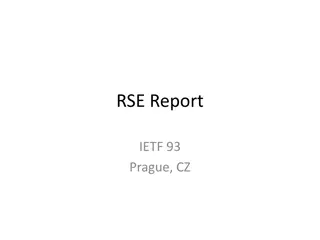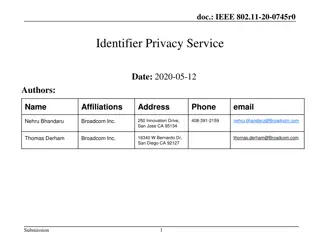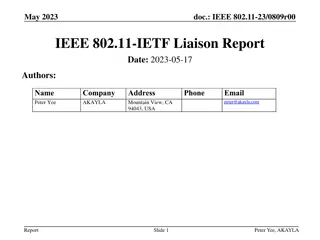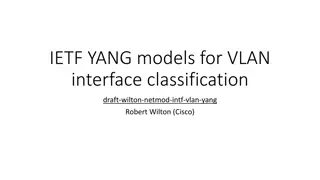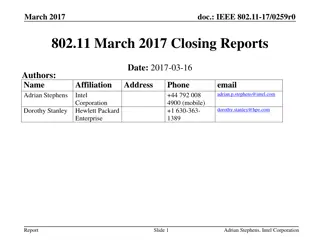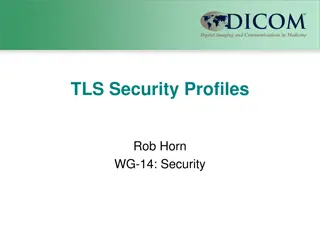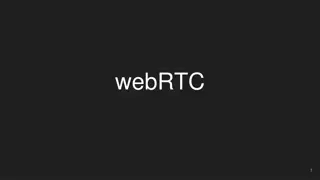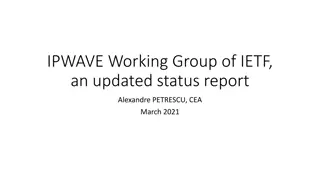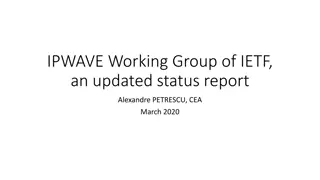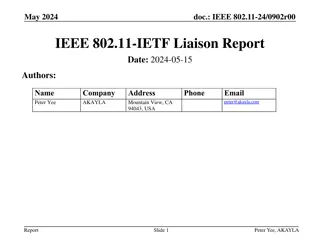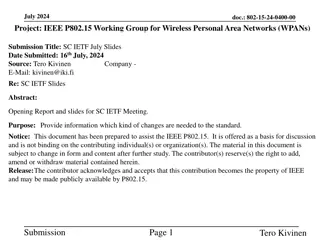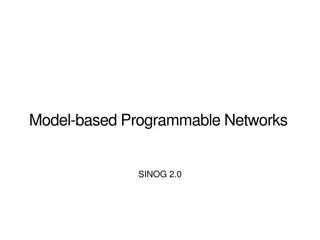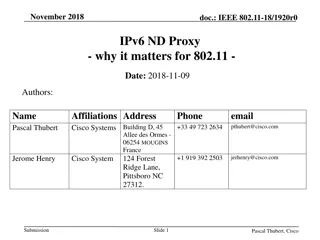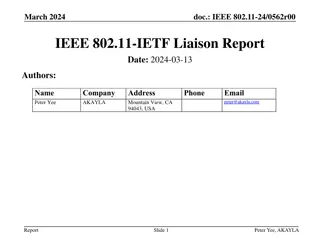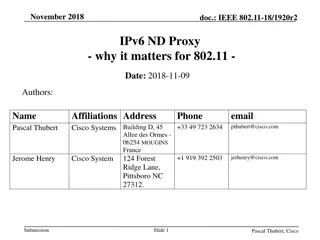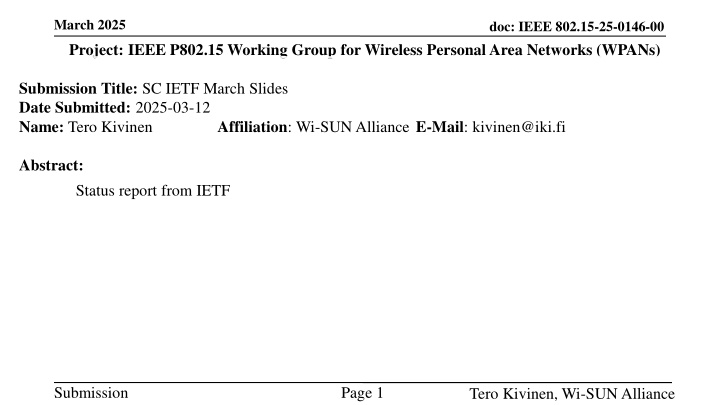
IEEE 802.15 Working Group Update on Wireless Personal Area Networks
Stay updated on the latest developments in wireless personal area networks with the IEEE 802.15 Working Group. Get insights on upcoming events, working group agendas, and key topics discussed at the IETF meetings. Join discussions on IPv6 over networks of resource-constrained nodes, lightweight authenticated key exchange, and software updates for the Internet of Things.
Download Presentation

Please find below an Image/Link to download the presentation.
The content on the website is provided AS IS for your information and personal use only. It may not be sold, licensed, or shared on other websites without obtaining consent from the author. If you encounter any issues during the download, it is possible that the publisher has removed the file from their server.
You are allowed to download the files provided on this website for personal or commercial use, subject to the condition that they are used lawfully. All files are the property of their respective owners.
The content on the website is provided AS IS for your information and personal use only. It may not be sold, licensed, or shared on other websites without obtaining consent from the author.
E N D
Presentation Transcript
March 2025 Project: IEEE P802.15 Working Group for Wireless Personal Area Networks (WPANs) doc: IEEE 802.15-25-0146-00 Submission Title: SC IETF March Slides Date Submitted: 2025-03-12 Name: Tero Kivinen Affiliation: Wi-SUN Alliance E-Mail: kivinen@iki.fi Abstract: Status report from IETF Submission Page 1 Tero Kivinen, Wi-SUN Alliance
March 2025 doc: IEEE 802.15-25-0146-00 Agenda for March Discuss what will be happening in IETF 122 Bangkok (March 15 21, 2025) Submission Page 2 Tero Kivinen, Wi-SUN Alliance
March 2025 doc: IEEE 802.15-25-0146-00 IETF 122 IETF 122 will be held in Bangkok, March 15 21, 2025 Registration is open Registration There is registration fee waivers program Almost all remote participation requests are accepted. https://www.ietf.org/meeting/registration-fee-waivers/ Submission Page 3 Tero Kivinen, Wi-SUN Alliance
March 2025 doc: IEEE 802.15-25-0146-00 Working groups to cover 6lo Ipv6 over Networks of Resource- constrained Nodes Lake Lightweight Authenticated Key Exchange Suit Software Updates for Internet of Things Submission Page 4 Tero Kivinen, Wi-SUN Alliance
March 2025 6lo Ipv6 over Networks of Resource- constrained Nodes doc: IEEE 802.15-25-0146-00 Will meet in 122 Agenda Ipv6 Neighbor discovery prefix registration, path-aware semantic addressing, generic address assignment, SCHC-compressed Packets over IEEE 802.15.4, Ipv6 packets over short-range OWC Submission Page 5 Tero Kivinen, Wi-SUN Alliance
March 2025 doc: IEEE 802.15-25-0146-00 6lo Work in progress Published as RFC RFC 9685 Listener Subscription for IPv6 Neighbor Discovery Multicast and Anycast Addresses, 2024-11 WG documents Path-Aware Semantic Addressing (PASA) for Low power and Lossy Networks draft-ietf-6lo-path-aware-semantic-addressing Transmission of SCHC-compressed packets over IEEE 802.15.4 networks draft-ietf-6lo-schc-15dot4 Transmission of IPv6 Packets over Short-Range Optical Wireless Communications draft-ietf-6lo-owc Generic Address Assignment Option for 6LowPAN Neighbor Discovery draft-ietf-6lo-nd-gaao Submission IPv6 Neighbor Discovery Prefix Registration Page 6 Tero Kivinen, Wi-SUN Alliance
March 2025 doc: IEEE 802.15-25-0146-00 Lake Lightweight Authenticated Key Exchange Will meet in 122 Agenda Authz, app profiles, implementation considerations, grease, remote attestation, PSK, QR discussion Submission Page 7 Tero Kivinen, Wi-SUN Alliance
March 2025 doc: IEEE 802.15-25-0146-00 Lake Work in progress WG documents Coordinating the Use of Application Profiles for Ephemeral Diffie-Hellman Over COSE (EDHOC) draft-ietf-lake-app-profiles Lightweight Authorization using Ephemeral Diffie-Hellman Over COSE (ELA) draft-ietf-lake-authz Implementation Considerations for Ephemeral Diffie-Hellman Over COSE (EDHOC) draft-ietf-lake-edhoc-impl-cons Remote attestation over EDHOC draft-ietf-lake-ra EDHOC Authenticated with Pre-Shred Keys (PSK) draft-ietf-lake-edhoc-psk Submission Applying Generate Random Extensions And Sustain Extensibility (GREASE) to EDHOC Page 8 Tero Kivinen, Wi-SUN Alliance
March 2025 doc: IEEE 802.15-25-0146-00 Suit Software Updates for Internet of Things Will meet in 122 Agenda Suit manifest, trust domains, firmware encryption, report, mud, mti, update management Submission Page 9 Tero Kivinen, Wi-SUN Alliance
March 2025 doc: IEEE 802.15-25-0146-00 Suit Work in progress RFC Editor Queue A Concise Binary Object Representation (CBOR)-based Serialization Format for the Software Updates for Internet of Things (SUIT) Manifest draft-ietf-suit-manifest Strong Assertions of IoT Network Access Requirements draft-ietf-suit-mud IESG Evaluation Encrypted Payloads in SUIT Manifests draft-ietf-suit-firmware-encryption SUIT Manifest Extensions for Multiple Trust Domains draft-ietf-suit-trust-domains AD Evaluation Secure Reporting of Update Status draft-ietf-suit-report Submission Mandatory-to-Implement Algorithms for Authors and Recipients of Software Update for the Internet of Things manifests Page 10 Tero Kivinen, Wi-SUN Alliance
March 2025 doc: IEEE 802.15-25-0146-00 BOFs nasr Network Attestation for Secured foRwarding skex Symmetric Key Establishment and Exchange Submission Page 11 Tero Kivinen, Wi-SUN Alliance
March 2025 nasr Network Attestation for Secured foRwarding doc: IEEE 802.15-25-0146-00 In the current network deployments, communicating entities implicitly rely on peer entities and use paths as determined by the control plane. These available path(s) are implicitly trusted. Communicating entities have very little information about the entities in the paths over which their traffic is carried, and have no available means to audit the entities and paths, beyond basic properties like latency, throughput, and congestion. However, increased demand in network security, privacy, and robustness makes tools for enabling visibility of the entities' security posture a necessity. With additional security and privacy requirements, there is a need to provide enhanced or added services beyond the pure encryption-based data security; requiring better visibility of the security posture of the underlying network elements. Specifically, to satisfy the visibility of the network elements' security state, proof that data is traversed through network elements (devices, links and services) that satisfy security posture claims to avoid exposure of unqualified elements is needed. Submission WG Forming Page 12 Tero Kivinen, Wi-SUN Alliance
March 2025 skex Symmetric Key Establishment and Exchange doc: IEEE 802.15-25-0146-00 Symmetric key establishment systems can be used to semi-statically and dynamically provide or supplement keys for existing protocols that accept pre-shared or pre-positioned keys independent of a public key and so might create hybrid keys. For example TLS 1.3 (RFC 8446 and RFC 8773), IPsec (RFC 8784) and MACsec (draft-hb-intarea-eap-mka-00). Asymmetric-key cryptography, while powerful and often convenient, has limitations, including being computationally intensive and potentially vulnerable to quantum computing or mathematical attacks, thus not fully addressing all security needs. This emphasises the need for symmetric-cryptography-based key establishment mechanisms that don't rely on asymmetric algorithms. Such systems can provide keys for secure internet communications. Proposed solutions must address not only the secure transport of symmetric keys but also the mechanisms needed to ensure that only authenticated and authorised peers can securely access these keys. Identifying the peers is part of the enrolment process. The proponents' goal is to create a framework for secure establishment of symmetric keys to match security requirements, and to streamline their integration into applications. The second objective is to propose one or multiple protocols for symmetric key establishment. WG Forming Submission Page 13 Tero Kivinen, Wi-SUN Alliance


